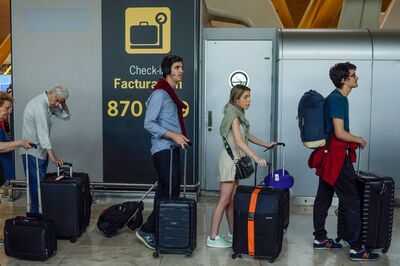
Around 30 million passengers are set to face delays this summer, as the worst air traffic control (ATC) issues in 25 years are due to take place, travellers have been warned.
Last year summer holidaymakers experienced the worst air traffic control delays since 2001, mostly due to staffing issues. This year it is set to be even worse, with 30 million UK air passengers expected to experience delays between June and August according to chief executive .
He told the Independent: "It will be worse than last summer, particularly at weekends. Europe needs to fix what is a broken air traffic control system, which we pay ridiculously expensive fees for."
READ MORE:

The Eurocontrol Performance Review Report for 2024 reveals that during the summer months of June, July and August last year, one in three flights arrived more than 15 minutes behind schedule — the industry threshold for a delayed flight. Whilst adverse weather caused many delays, a shortage of air traffic controllers was also evident.
In addition, the Eurocontrol review showed that many cases involving staff shortages may have been wrongly attributed to weather. The report adds that a capaxity cut due to staffing "could result in a financial penalty", while blaming the delay on adverse weather conditions "could even result in a financial bonus".
Around 90 million passengers are expected to fly to or from UK airports between June and September 2025. However, it is likely that 30 million will arrive a quarter of an hour or more behind their schedule, which could jeopardise connections, reduce time on holiday and add pressure to airlines.
Now, Dr Peter Whysall who conducted the review forhas called the constraints "a cause for concern", adding that performance is "likely to get worse unless structural issues are addressed".
The report also shone a spotlight on the worst offenders, including the destinations responsible for the most delays. Karlsruhe was responsible for the largest portion of delays, equalling 13.1 per cent. It was followed by Budapest (12.9 per cent), Marseille (seven per cent), Zagreb (6.5 per cent) and Reims (six per cent).
According to , the was responsible for a quarter of delays, with the organisation stating: "The DGAC provides efficient air navigation services of high quality in terms of safety, the environment and capacity, at the best cost."
Ben Smith, chief executive of added: "The shortage of air traffic controllers [in France] is 20-25 per cent, which means many of our flights are going to be delayed, and we already know this."
However, Air France and KLM are susceptible to delays due to the amount of passengers connecting through their hubs in and Amsterdam respectively. Transfers of an hour or less between flights are common, and a delayed arrival can result in many of the connections being missed.
Airlines are responsible for providing customer care and rearranging onward travel through, even if they are not responsible for the delay. "Today, it’s just ‘Throw it on the airline.’ It’s easy," shared Mr Smith. "To be beaten up in a way that costs us, and ultimately costs customers, is not correct. It’s not good for anybody."
The commented: "Insufficient airspace capacity, as seen in recent years, leads to long delays and difficulties for passengers. These delays affect the efficiency of the entire air transport system. Delays are the cause of additional costs for airlines, and they increase the sector’s carbon footprint, with additional emissions from aircraft flying more fuel-inefficient routes."